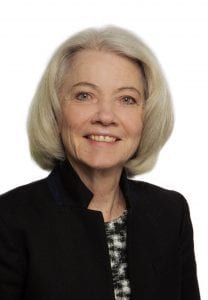“…Some of the most exciting bursts of creativity come when you pivot.”
 An interview with Terry Jernigan, PhD
An interview with Terry Jernigan, PhD
Professor of Cognitive Science, Psychiatry, and Radiology
Director, Center for Human Development
Co-Director, ABCD Study Coordinating Center
UCSD
By: Michelle Johnson (3/15/19)
What did you want to grow up to do when you were little?
At the age of 12, I told somebody that when I grew up, I was going to be a psychologist, but I did not have any idea what that meant. I think I had something about counseling in my mind when I said that. But the people in my family were not academics, so when I went off to college, it was like a whole new world for me.
What research questions are at the forefront of your mind right now?
Well, about 15 years ago I had a mid-life shift. I had done a lot of work over the years looking at brain imaging mainly in different neuropsychiatric disorders and trying to understand if there are insights in terms of biological differences. But I recognized that there were some really important questions that we weren’t answering about brain development.![]()
What I quickly recognized when I began to work in this area is that it is an extraordinarily complex set of processes. Understanding the individual differences and the trajectories of mental, social, and emotional functions is what I’m mostly interested in, and to [understand] something this complicated means we really have to take the science up a notch—we have to do this research at scale, and we have to observe these things simultaneously: the biology, the behavior, the environment, the culture, the genomic information. What we want to do is to identify those factors in the developing child that are protective and make sure that we provide as many of those to as many kids as possible.
What has your experience been like working in interdisciplinary settings?
First of all, it turns out that when you go out in the scientific community, people vary a lot in terms of how experienced they are, how productive they are, and so on. But they also vary in terms of how open they are to collaborative work. It’s important to get people who are absolutely at the top of their field but who have that additional quality of being interested in other people’s point of view, of valuing other people’s contributions. The other thing is it’s important for people to be able to assume ownership by having a decision-making process that is collaborative, but that allows the experts to manage the decisions in their domain.
What has been your most surprising experience working in this field?
About 15 years ago, I ended up spending a protracted period of time in Denmark. I was already a professor at that time, and I had my own research programs, a lot of people in my lab, I was on committees. But I had strong family connections in Denmark, and it was important to my family to make this happen so I had to disassemble some parts of my professional life. That opened up opportunities I wouldn’t have had at that point in my career, and it was extremely liberating for me. I actually started my first developmental longitudinal developmental study in Copenhagen; I’d never done that before. When I went back San Diego full-time, I made the switch into the Center for Human Development and decided to focus the rest of my career on development. It completely reinvigorated my intellectual and scientific life.
What’s one piece of advice you’d give to people just starting out?
I often tell people that there may be these bumps in the road that sometimes mean you have to step back or there’s an obstacle and you can’t keep going along the main path. But they can be blessings in disguise because sometimes they lead you to take stock and think a little bit more and look more broadly at a where you might go. I don’t think that you have to be on a beeline as a young professional because some of the most exciting bursts of creativity come when you pivot.
To learn more about Dr. Jernigan and her work, click here.
Click here to go back to the “Interviews with Scientists” page.
